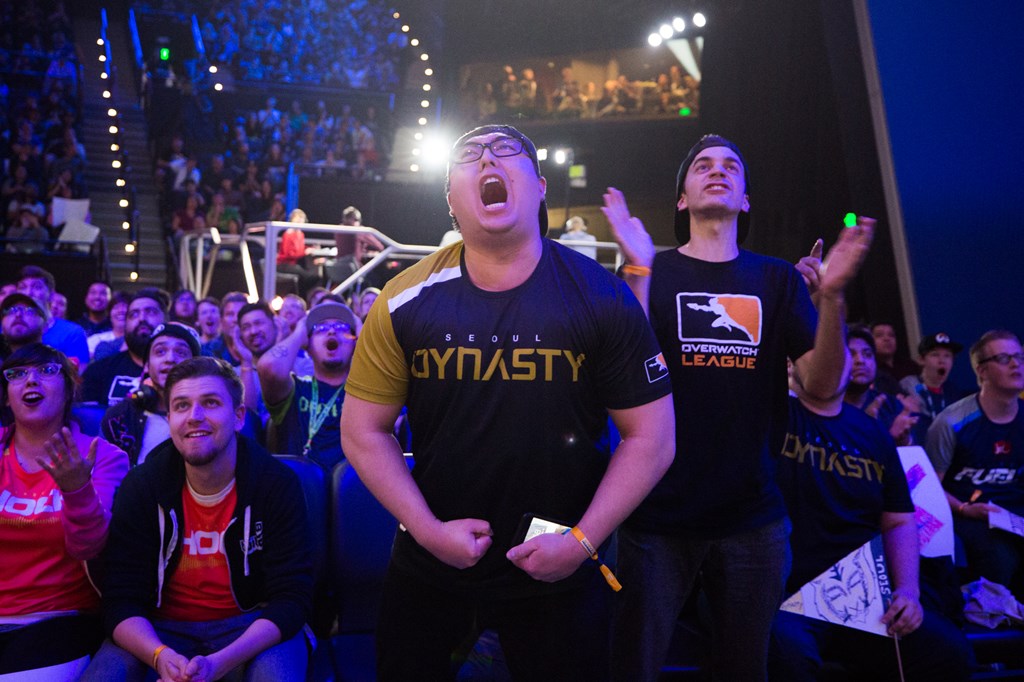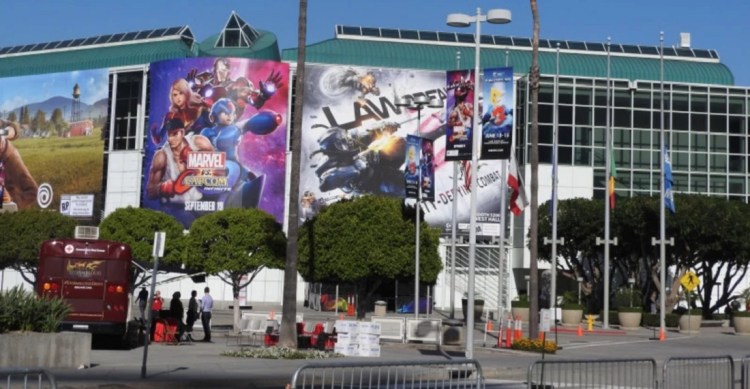
Above: Esports is on the rise.
Audience: You’re saying it’s ubiquitous.
GamesBeat: The average age is 38, right?
Pachter: Right, but including all these mobile gamers. The thing is, the guys who grew up as teenagers playing Call of Duty in 2006 and 2007, now they’re in their 20s. They’re still playing. In 10 years they’ll be in their 30s, still playing. I don’t think that goes away. They’ll get jobs and have demanding lives – kids, spouses, all that stuff – and that’s why going off console is going to save them. But they’re going to be playing games. I think the demographic is awesome.
GamesBeat: Demographics are part of the argument around why esports is getting so much attention now. It’s attractive. There are 165 million viewers for esports in 2018, and that’s projected by Newzoo to go to 550 million in three years.
June 5th: The AI Audit in NYC
Join us next week in NYC to engage with top executive leaders, delving into strategies for auditing AI models to ensure fairness, optimal performance, and ethical compliance across diverse organizations. Secure your attendance for this exclusive invite-only event.
Pachter: That’s crazy.
GamesBeat: The millennials have dropped out of TV, right? They’re watching something, though. They’re watching their favorite games being played. For the longest time the knock against esports was that it’s never fun to watch someone else play a game. It’s more fun to play the game yourself. But then Twitch came along and changed all of that. 100-million-plus people watch each other play games every month.
With esports, then, all of the traditional sports owners are diving in and investing here. I don’t know if you think Ballmer’s $2 billion purchase of the Los Angeles Clippers was a smart move, or maybe the last move of its kind. Robert Kraft, the Patriots owner, the Mets owners, the 76ers owners, they’ve all made investments in esports teams. They’re expecting that this audience of hundreds of millions of people is going to monetize. The problem, I think, with the NBA now—say the NBA can monetize their fans at three to five times what the esports fans are monetizing at in a given year. The esports fan spends $3-5, while the NBA fan spends $15-75. That’s the difference you see in the size of the industry.
But the owners are saying, “Look at these hundreds of millions of people. We think we’ll learn how to monetize them.” Whether it’s merchandise or other sorts of things. That’s the hype argument behind esports, why its rise is inevitable and why so many hundreds of millions or billions of dollars are going to be invested here. Not only into teams, but into platforms to serve the games, and venues as well. There are venues being built in Las Vegas right now just for esports.
Pachter: You guys know the sports model, which is the leagues are exempt from anti-trust. They’re co-ops. The owners split up the television contract. I don’t know that you get that in esports. I don’t know if it’s possible. Activision’s kind of doing it. But Activision, the league, says, “We’re going to keep half of the profit and give half to the owners.” There’s something wrong with that. The NFL, other than Roger Goodell getting his $50 million, doesn’t keep any money when it’s over. FIFA doesn’t keep any money when it’s over. They have plenty, but it gets paid out.
I don’t know how an individual company suckers these supposedly bright billionaires into investing when they’re not getting to keep all the fruits of their labor. I actually think we’re going to see anti-trust suits when players decide to switch teams. That’s going to happen. They have a contract now, but what happens when the contract is up? Do they have the right to perpetuity? That’d be an interesting legal case, but I think they’re going to lose, Curt Flood be damned.
Audience: I don’t know if I’ve formulated my view on this completely, but I think there’s a big difference between esports, if we think about it as somebody owning an IP portfolio that has taken a lot of time and effort and creative and R&D to develop, and then sports like baseball and soccer—I’m sure a lot of time and effort originally went into formulating how those games work. But depending on the sport it was years ago.
Pachter: Yeah, they’re all public domain. But the NFL itself is not public domain. The organization is not public domain.

Above: Steve Arhancet holds trophy as Team Liquid wins the spring finals for the North American LCS esports tournament.
Audience: But the big difference I see is that the owner of an IP portfolio gets to create that product. Creating the game itself, making it better, seeing it involved is something that we, particularly as lawyers, have to grapple with. Maybe the answer is, as it evolves, it might be that the community gets to influence how that rev share works out.
But intellectually—I represented Sterling, which bought the New York Excelsior team for the Overwatch League. Intellectually I understood where Activision Blizzard was coming from. This is something they own. It’s their IP. They’re creating this new thing for the community. It might evolve over time. But I think it’s an interesting dilemma, to encourage creativity but at the same time allow the sport to evolve.
Pachter: Everything you say is right. I posed the question, “Will Overwatch be a thing in five years?” That’s the problem. If you sell an esports team and you tell the owner, “You have the right to any Activision IP forever,” that’s valuable. I trust Activision Blizzard to come up with something to replace Overwatch if it fades. But if you buy an Overwatch League team, what kind of a moron are you? How long until there’s a game that’s better? Next week? I don’t get why they’re buying these teams.

Above: A Seoul Dynasty fan cheers on his team in the Overwatch League
GamesBeat: There’s a way to invest, though, where you cushion yourself against that problem, right? If you’re the venue owner and you build an arena for esports, one week it’s H1Z1, and the next week it’s Fortnite, and the next week it’s PUBG. The owner is going to fill those seats regardless of which game is hot or not.
Pachter: This is why I think the sports analogy is the right one. I truly think, if you were to take all the esports that exist and then compare them to real sports—League of Legends is like soccer. About half the audience cares about League of Legends. One step down from that is probably all the Valve properties – Counter-Strike, DOTA, and Team Fortress. That’s probably 20 percent of all audiences. And then all of the Activision properties – Call of Duty and Overwatch primarily, with some StarCraft. That’s probably 15 percent. The other 15 percent is everything else. It’s women’s ice hockey and bicycle racing. You realize that each of those as a sport has a tiny audience.
When we hear the 165 million number from Newzoo, 80 million of them are watching League of Legends. Activision doesn’t own any of that. So why isn’t League of Legends selling franchises? Maybe they will. But like I said, I think that for the sport, for Activision to say, “We are FIFA, we’re the NFL, we’re going to dominate,” that’s remarkably arrogant.
Audience: We’ll see if this becomes the equivalent of real-world sports, which it might. We don’t know. In my mind – this is my personal view – it has to evolve, and maybe it will become what the NFL looks like now. It’s just not there yet.
Pachter: I’d say 10 years. It’s going to happen.
Audience: I have a 13-year-old son. I was going to take him on a trip, and I asked him, “If you had your choice, where in the world would you like to go?” He said, “I want to see the finals of the Overwatch League in Los Angeles.” We live the fact that there is a generation where that’s the same as watching Steph Curry play for the Warriors.
Pachter: It is for those people, certainly.

